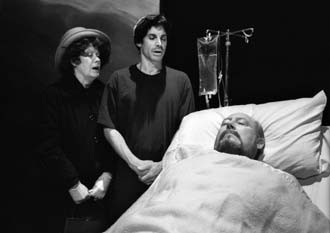|
Tony Kushner's 'Angels' aren't warm and fuzzy, but don't kill the messenger We have a fundamental misunderstanding about angels in the New Age-influenced early years of the new millennium. We wear angel charms, give angel cards to our friends, and talk about our guardian angels. Or, if we're more traditionally inclined, we misunderstand angels as de facto placeholders for a vapid, vanilla religiosity, symbols of bumper-sticker simplifications such as "God is Love." The truth is that angels are (etymologically) simply messengers. Cosmologically, they have more often been seen as at odds with God, and vengeful toward the humans He created. These are the angels of Tony Kushner's Angels in America, and the fact that they're not the Hallmark card variety may have something to do with the baffling audience response to the impressive production of Kushner's ambitious work now onstage at the San Pedro Playhouse. Set almost entirely within a five-month period between October 1985 and February 1986, the early years of the AIDS crisis, Angels consists of two full-length plays, Millennium Approaches (the tighter, if more expository, of the two; see "The Bark is `a little` bigger than the bite," September 30-October 6, 2004), in which relationships disintegrate in a series of abandonments and escapes, and Perestroika, in which the pigeons of Millennium come home to roost. Perestroika is made up largely of a series of unexpected scenes of forgiveness, the most famous of which is arguably the scene in which the ghost of alleged Soviet spy Ethel Rosenberg says Kaddish over the body of lawyer and Washington power broker Roy Cohn, the man responsible for her execution. Perestroika, to filch a line from one of the characters, "has to do with God, and so it isn't very nice." It's the play in which Kushner has to explain the climactic household invasion-by-angel that was the final onstage image of Millennium. He does so by describing a cosmology in which God has abandoned Heaven and the angels, like jealous older siblings, have decided that it's all the fault of humankind: the human race's interesting, chaotic motion has lured God's attention away from the static perfection of Heaven (never mind that the humans in the play aren't feeling the presence of God either!) and so the angels have sent one of their own as a messenger to the AIDS-stricken, abandoned Prior Walter. She tells him he is a prophet, a messenger himself, and gives him the Tome of Immobility from which he is to spread the message the angels want us to hear: Stop moving!
"Drink once of this bitter water and never thirst again," the angel tells him. But Prior, on our behalf, rejects resignation. He demands more life, even in illness, even in the face of approaching apocalypse. His is the soaring message of hope that is the true angel of the title ("an angel is just a belief with wings"), and he becomes its prophet by rejecting the prophecy. Perestroika is, textually, the messier of the two plays, the one charged with drawing the sprawling threads together. This is a piece that, in its entirety, "ranges from earth to heaven; focuses on politics, sex and religion; transports us to Washington, the Kremlin, the South Bronx, Salt Lake City and Antarctica; deals with Jews, Mormons, WASPs, blacks," as Jack Kroll of Newsweek described it. But Perestroika provides more meat for the actors. The hard-working cast of Millennium all continue their roles in Perestroika, and there are some very fine performances. Any time Allan S. Ross (Roy Cohn) or Vincent Hardy (Belize) are onstage, the energy spikes markedly. Their several scenes together drew spontaneous applause on Saturday night. Wade Young's Prior Walter is nuanced, honest, and wry, and Anna Gangai, as the angel, rises (no pun intended) to one of the greatest theatrical challenges ever posed to an actress: her voice really could induce orgasm. So why are audiences staying away? Or, worse yet, walking out half-way through? Certainly it's not that we can't take brief nudity, and the occasional realistic language. And it can't possibly be that we're unable to see the transcendent handling of the perennial human themes of hope and despair, responsibility, freedom, change, and redemption, because they're embedded in the story of homosexual characters. Surely that wouldn't keep us from seeing an excellent production of one of the most important pieces of 20th-century American theatre? No, it must be the angels. Where's Roma Downey when we need her? • Note: Perestroika productions alternate with Millennium Approaches October 22-31. Visit http://san_pedro_playhouse.tripod.com/ for a complete schedule.
|

KEEP SA CURRENT!
Since 1986, the SA Current has served as the free, independent voice of San Antonio, and we want to keep it that way.
Becoming an SA Current Supporter for as little as $5 a month allows us to continue offering readers access to our coverage of local news, food, nightlife, events, and culture with no paywalls.
Scroll to read more Arts Stories & Interviews articles
Newsletters
Join SA Current Newsletters
Subscribe now to get the latest news delivered right to your inbox.















